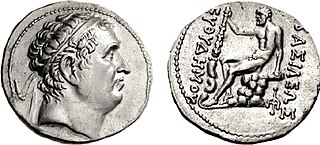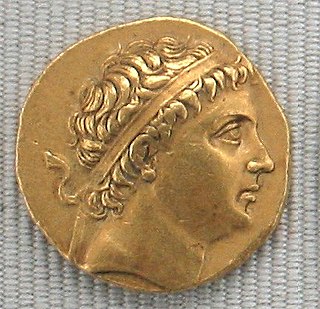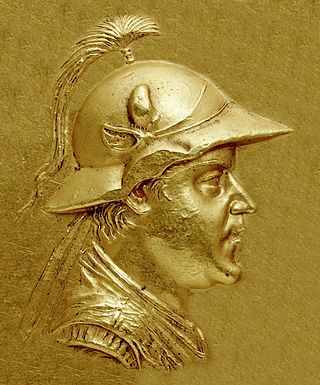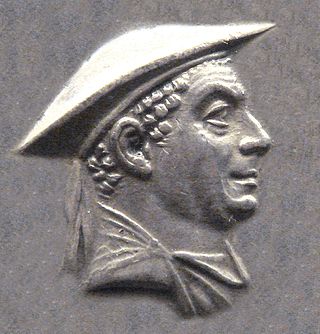
Euthydemus I was a Greco-Bactrian king and founder of the Euthydemid dynasty. He is thought to have originally been a satrap of Sogdia, who usurped power from Diodotus II in 224 BC. Literary sources, notably Polybius, record how he and his son Demetrius resisted an invasion by the Seleucid king Antiochus III from 209 to 206 BC. Euthydemus expanded the Bactrian territory into Sogdia, constructed several fortresses, including the Derbent Wall in the Iron Gate, and issued a very substantial coinage.

Diodotus I Soter was the first Hellenistic king of Bactria. Diodotus was initially satrap of Bactria, but became independent of the Seleucid empire around 255 BC, establishing the Greco-Bactrian Kingdom. In about 250 BC, Diodotus repelled a Parthian invasion of Bactria by Arsaces. He minted an extensive coinage and administered a powerful and prosperous new kingdom. He died around 235 BC and was succeeded by his son Diodotus II.

Demetrius I Anicetus, also called Damaytra was a Greco-Bactrian and later Indo-Greek king, who ruled areas from Bactria to ancient northwestern India. He was the son of the Greco-Bactrian Kingdom's ruler Euthydemus I and succeeded him around 200 BC, after which he conquered extensive areas in what is now southern Afghanistan, Iran and Pakistan and India.

Menander I Soter, sometimes called Menander the Great, was a Greco-Bactrian and later Indo-Greek King who administered a large territory in the Northwestern regions of the Indian Subcontinent and Central Asia. Menander is noted for having become a patron and convert to Greco-Buddhism and he is widely regarded as the greatest of the Indo-Greek kings.

The Indo-Greek Kingdom, also known as the Yavana Kingdom, was a Hellenistic-era Greek kingdom covering various parts of modern-day Afghanistan, Pakistan and northwestern India.

Apollodotus I, known in Indian sources as Apaladata, was an Indo-Greek king from 180 BC to 160 BC, or between 174 and 165 BC who ruled the western and southern parts of the Indo-Greek kingdom, from Taxila in the Punjab region to the areas of Sindh and possibly Gujarat.

Eucratides I, also known as Eucratides the Great, was one of the most important Greco-Bactrian kings. He conquered large parts of northern India, and minted a vast and prestigious coinage, suggesting a rule of considerable importance and prosperity. His immediate successors were the last Greek kings to rule in Bactria.

Antimachus I Theos, known as Antimakha in Indian sources, was one of the Greco-Bactrian kings, generally dated from around 185 BC to 170 BC.

Euthydemus II was a Greco-Bactrian king who ruled in Bactria in 185-180 BCE.

Agathocles I Dicaeus was a Greco-Bactrian/Indo-Greek king, who reigned between around 190 and 180 BC, likely of the dynasty of Diodotus I, due to his commemoration of Antiochus Nicator.

Diodotus II Theos was the son and successor of Diodotus I Soter, who rebelled against the Seleucid empire, establishing the Graeco-Bactrian Kingdom. Diodotus II probably ruled alongside his father as co-regent, before succeeding him as sole king around 235 BC. He prevented Seleucid efforts to reincorporate Bactria back into the empire, by allying with the Parthians against them. He was murdered around 225 BC by Euthydemus I, who succeeded him as king.

Agathoclea Theotropus was an Indo-Greek queen married to Menander I, who ruled in parts of northern India in the 2nd-century BC as regent for her son Strato I. Born in Bactria, likely to a noble family with some authors such as Tarn alleging she was a daughter of Eucratides, however this is uncertain and Tarn is often criticised by modern authors for casually creating dynastic relationships. Nonetheless, Agathoclea would become one of the first woman ruler in the Hellenistic world, and she seems to have been relatively significant due to her large presence on the coins of Strato I.
Within the Indo-Greek Kingdom there were over 30 kings, often in competition on different territories. Many of them are only known through their coins.

The History of the Indo-Greek Kingdom covers a period from the 2nd century BCE to the beginning of the 1st century CE in northern and northwestern Indian subcontinent. There were over 30 Indo-Greek kings, often in competition on different territories. Many of them are only known through their coins.

Antiochus Nicator is a proposed Greco-Bactrian king of the Diodotid dynasty, who ruled for some period between 240 – 220 BC. His existence is controversial.

The Greco-Bactrian Kingdom was a Greek state of the Hellenistic period located in Central Asia. The kingdom was founded by the Seleucid satrap Diodotus I Soter in about 256 BC, and continued to dominate Central Asia until its fall around 120 BC.

Strato IIIPhilopator was an Indo-Greek king who ruled c. 25 BCE to 10 CE. He is only known through the joint coins with his father Strato II. He may have been supplanted, in conjunction with his father or later as an independent king, by the Indo-Scythian Northern Satraps, particularly Rajuvula and Bhadayasa, whose coins were often copied. Strato was the last of the line of Diodotus and independent Hellenistic king to rule at his death in 10 AD.

The Diodotid dynasty was a Hellenistic dynasty founded by Seleucid viceroy Diodotus I Soter c. 255 BC, ruling the far-eastern Kingdom of Bactria. The Diodotids were the first independent Greek kings to rule in Bactria.
This family tree is based on a combination of Tarn's and Narain's genealogies of the Greco-Bactrian kings, which are not necessarily fully correct, as with all ancient family trees. Additionally, according to Tarn and Narain, the Eucratid dynasty is descended from Laodice, sister of Antiochus the Great and daughter of Seleukos II, whose sister married Diodotus I, the first Greco-Bactrian king. Additionally, one of Diodotus's descendants, the Greco-Bactrian ruler Demetrius the Unconquered, the first Indo-Greek king, married a daughter of Antiochus III the Great and had issue, which is shown here below. Thus, most of the Greco-Bactrian kings are related to each other through the Seleukid Dynasty, and thus, are related to the Diadochi and Alexander the Great. Perhaps Menander, an Indo-Greek king, married a probable daughter of Eucratides the Great, meaning the Indo-Greek kings are related as well. This tree covers all the Greek rulers of Bactria and India, from 255 B.C. to A.D. 10. This article also covers the family trees of the rulers of the post-Greco-Bactrian state of Dayuan and Oxyartes's family tree and his relationship to the Greco-Bactrian kings. To find more information on the various dynasties and rulers, see these articles: Greco-Bactria, Indo-Greeks, Diodotids, Euthydemids, Eucratids, Menanderids, Indo-Scythians, the Dayuan, and the Yavana people. See the various chronologies and lists of rulers below the trees for easier navigation and understanding of the placement of the various kings in each tree.

















